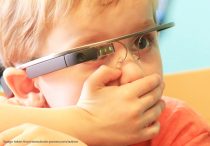
A new app-controlled pressure vest to reduce anxiety for kids with ASD and augmented reality (AR) glasses to improve social interaction are in development this year and doing well in peer-reviewed studies.
For many years now, researchers in the autism field have focused on technology-aided approaches to help improve everything from communication challenges and social interactions to the behavioral challenges and anxieties often associated with autism spectrum disorder. Technological aids seem like a particularly hopeful path, since many adults and children with autism have a natural affinity toward technology and tend to relate better to objects than to people. Two new high-tech supports on the horizon this year are currently in the developmental stage.
A Smart, App-Controlled Pressure Vest
Weighted blankets and pressure vests are common low-tech supports that provide children with autism a way to rest, recharge, and reduce anxiety. However, one of the problems with weighted blankets and clothing is that, at some point, you have to take the item off in order to function—which can be disruptive and socially awkward for the student.
A new, high-tech version from researchers at the University of Minnesota is being touted as the world’s first dynamic pressure vest. This pressure vest was created from components designed for a spacesuit to send astronauts to Mars—but a grad student at the university, Julia Duvall, saw the technology and immediately thought of her nephew, who has ASD and struggles with weighted clothing.
With the connected app, wearers of the dynamic pressure vest can easily control the amount of pressure that they receive, depending on the situation. The technology also makes the comfort aid much less disruptive, enabling students to self-regulate in a nearly invisible way, without having to get up in front of the entire class, go to a designated area, or put on or take off clothing.
AR Glasses that Give Social Cues
Also in development are a new pair of smartglasses that could help children with autism better understand the people around them. Social interaction skills are necessary for independent living and being able to thrive with ASD—most parents list the development of social skills and the ability to make friends at the top of their list of desires for their special needs child.
The Brain Power Autism System (BPAS), is a novel AR smartglasses-based social communication aid for children and adults with ASD. The smartglasses use emotion-based artificial intelligence to let wearers know how other people are feeling or responding to them, pick up on eye contact, body language, and other social cues, and coach the wearer through appropriate conversation, like a wearable life coach. Over time, the smartglasses should help wearers learn emotion recognition, face-directed gaze, and managing transitions.
The AR glasses are also in clinical trials as language acquisition, behavior control, and category formation devices—the developers refer to the technology as the world’s first wearable classroom. In addition to giving social cues, the smartglasses use gamification and adaptive learning techniques to increase the wearer’s motivation toward language in a way that’s completely tailored to the individual.
Unlike other assistive communication devices, such as apps on the phone or tablets, users can look up and make eye contact while using the Brain Power Autism System, making researchers hopeful that wearers will be able to use the device in a more natural, integrated way.
Both of these new wearable devices give users more individualized support and more control over when and how they receive support. It remains to be seen whether the AR glasses can be successful as a teaching device as well as a communication aid, but initial reports seem promising.
The Springbrook Autism Program works with children who are having acute behavioral challenges, helping them learn new coping skills, reduce anxiety, and become more successful at self-regulation. Call us at 864.834.8013 for a no-obligation consultation.